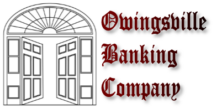Fraud Prevention
Web Disclaimer: Although every attempt has been made to ensure the reliability of all information contained herein, some inaccuracies may exist. For this reason, Owingsville Banking Company does not certify the accuracy of any of the reported data and expressly disclaims all liability to persons who access this site. This web site may link to external web sites for your convenience. This is for informational purposes only. Linked sites are not under the control of Owingsville Banking Company and thus we are not responsible for the contents of these sites. Furthermore, the act of linking to other external sites is not an endorsement of these sites by Owingsville Banking Company.
Internet Fraud Prevention
Owingsville Banking Company wants to help you protect yourself against internet scams. Fraudulent email is currently one of the most common and potentially damaging methods used to scam customers online. Education, awareness, and knowledge of a few simple tips will make it less likely that you will fall victim to one of these scams.
OWINGSVILLE BANKING COMPANY will never ask you to send personal or financial information by email or through a link in an email.
Common Scams Defined:
- Phishing – These are bogus emails that appear to come from a reputable company that you recognize and do business with, such as your financial institution. In some cases, the email may appear to come from a government agency. The emails typically attempt to get you to reveal information like user IDs, passwords, bank account numbers, social security numbers, or other sensitive information. This information can be used to access your accounts, financial information, or to perpetrate identity theft.
- Spoofing – A “spoofed” site is one that appears to belong to a legitimate company. The site may even look like the legitimate company’s site utilizing their colors and, perhaps, their logo. Typically, a bogus email is received asking you to supply, confirm or update sensitive personal information by clicking on a link in the email. The goal is to get you to enter the requested information so that they can steal it for their purposes.
Tips to Protect Yourself:
- Never provide your personal information in response to an unsolicited request.
- If you believe the contact may be legitimate, contact the financial Institution yourself.
- Never provide your password over the phone or In response to an unsolicited Internet request unless you Initiated the contact.
- Review account statements regularly to ensure all charges are correct.
What to do if You Become a Victim:
- Contact your financial institution immediately and alert it to the situation.
- If you have disclosed sensitive information, you should also contact one of the three major credit bureaus and discuss whether you need to place a fraud alert on your file. The following is contact information for each bureau’s fraud division:
- Equifax (800) 525-6285
- Experian (888) 397-3742
- TransUnion (800) 680-7289
- If you suspect that you’ve received a fraudulent email from Owingsville Banking Company,
DO NOT RESPOND TO THE EMAIL!
Contact us at 606-674-6317 or 674-2168.
MORE INFORMATION IS AVAILABLE FROM A FEDERAL BROCHURE ABOUT INTERNET PIRACY – CLICK BELOW
